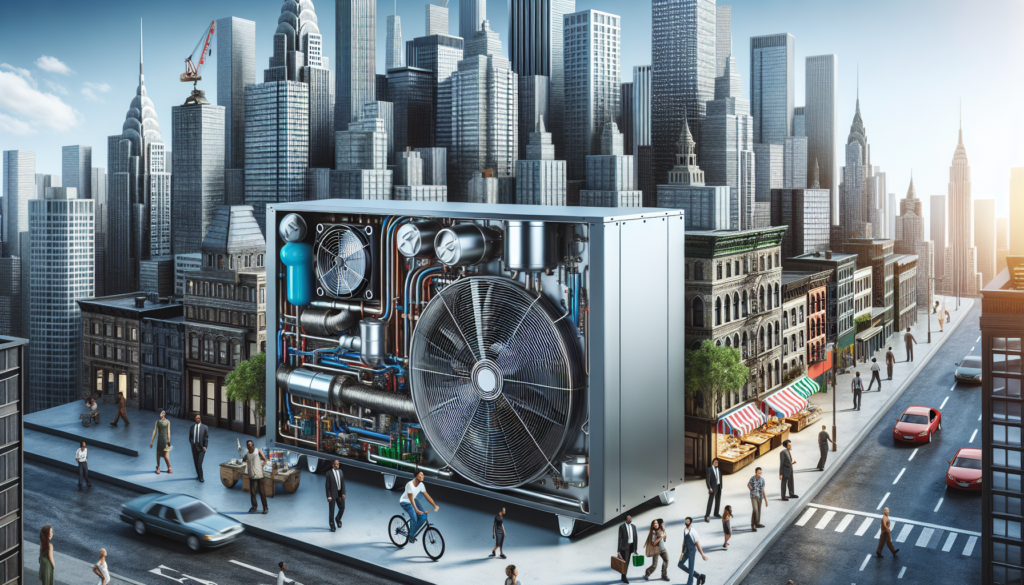Looking to kickstart your career in the HVAC industry? Look no further! This article provides valuable insight into entry-level HVAC jobs that are available near you, even if you have no prior experience in the field. Whether you’re passionate about working with heating, ventilation, air conditioning systems, or simply looking for a new career path, we’ve got you covered. Discover the possibilities and opportunities waiting for you right in your own backyard!

Entry Level HVAC Jobs Near Me
If you’re looking for a career in the heating, ventilation, and air conditioning (HVAC) industry, entry-level HVAC jobs can be a great starting point. These jobs offer the opportunity to gain valuable experience and launch your career in a field with steady demand and excellent career prospects. In this article, we will explore what HVAC jobs are, why you should consider entry-level positions, the benefits they offer, the job requirements, education and training options, certifications and licenses you may need, typical tasks and responsibilities, the tools and equipment used, average salaries, and how to find entry-level HVAC jobs near you.
What are HVAC jobs?
HVAC jobs involve the installation, maintenance, and repair of heating, ventilation, and air conditioning systems. These systems are essential for providing comfort and regulating temperature and air quality in residential, commercial, and industrial buildings. HVAC technicians play a crucial role in ensuring that these systems operate efficiently and effectively, making them vital to the functioning of various industries.
There are various types of HVAC jobs, including installation technicians who set up new HVAC systems, maintenance technicians who perform routine inspections and repairs, and service technicians who troubleshoot and fix issues with existing systems. Depending on the size and complexity of the HVAC system, technicians may focus on specific areas such as refrigeration, air conditioning, or heating.
Why choose entry-level HVAC jobs?
If you’re considering a career in the HVAC industry, entry-level positions can provide several compelling reasons to start at this level.
Opportunities for growth and advancement
Entry-level HVAC jobs serve as a stepping stone towards more advanced roles within the industry. They offer opportunities to gain hands-on experience and develop the skills necessary for growth and advancement in your career. With time and experience, you can progress to become a lead technician or supervisor, take on specialized roles, or even start your own HVAC business.
In-demand job market
The HVAC industry is experiencing strong growth, creating a high demand for skilled technicians. As buildings become more energy-efficient and as older systems are replaced, there is a continuous need for qualified HVAC professionals. By entering the industry at the entry-level, you can take advantage of this growing job market and secure stable employment.
Hands-on learning experience
Entry-level HVAC jobs provide a unique opportunity to learn through hands-on experience. You’ll have the chance to work directly with equipment and systems, gaining practical skills that are valuable in this trade. This real-world experience will enhance your understanding of HVAC systems and prepare you for more complex tasks as you progress in your career.
Great earning potential
HVAC technicians often enjoy competitive salaries and excellent earning potential. As you gain experience and expertise, your value to employers increases, allowing you to command higher wages. Additionally, specialized skills and certifications can further boost your earning potential and open doors to more lucrative opportunities.
Wide range of job opportunities
The HVAC industry offers a wide range of job opportunities. From residential and commercial HVAC systems to industrial and refrigeration systems, you can choose to specialize in different areas based on your interests and career goals. Whether you prefer working in homes, offices, hospitals, or factories, there are HVAC jobs available to suit your preferences.
Benefits of entry-level HVAC jobs
When considering entry-level positions in the HVAC field, it’s important to understand the benefits they offer.
Steady demand for HVAC technicians
One of the biggest advantages of entering the HVAC industry is the steady demand for technicians. HVAC systems are a necessity for maintaining comfortable living and working environments, which means there will always be a need for skilled professionals to install, maintain, and repair these systems. This demand ensures job stability and security, even during economic downturns.
Job stability and security
As mentioned, the HVAC industry provides job stability and security. Regardless of economic fluctuations, people will always require functioning HVAC systems to regulate temperature and air quality. By starting in an entry-level HVAC position, you can establish a solid foundation in the industry and enjoy long-term job security.
Excellent career prospects
The demand for skilled HVAC technicians, coupled with the advancement opportunities available, makes for excellent career prospects in this field. As you gain experience and further your education, you can take on more challenging and rewarding roles. A career in HVAC can provide a fulfilling and prosperous future.
Rewarding and challenging work
While entry-level positions may involve routine tasks, HVAC work can be rewarding and mentally stimulating. You’ll have the opportunity to solve problems, troubleshoot complex issues, and contribute to improving the comfort and safety of buildings. Knowing that your work directly impacts people’s lives can provide a great sense of satisfaction.
Opportunities for specialization and expertise
The HVAC industry offers a wide range of specialization options, allowing you to focus on specific areas that interest you. Whether you have a passion for refrigeration, air conditioning, or heating, there are opportunities to develop expertise and become a sought-after professional in your chosen field. Specialization can lead to higher earning potential and increased job satisfaction.

Job requirements for entry-level HVAC positions
To begin your career in an entry-level HVAC position, certain job requirements must be met.
High school diploma or GED
Most entry-level HVAC jobs require a high school diploma or a General Education Development (GED) credential. This educational foundation demonstrates basic knowledge in subjects like math, science, and English, which are necessary for understanding the technical aspects of the HVAC trade.
Basic mathematical and mechanical skills
Working with HVAC systems involves mathematical calculations and mechanical concepts. As an entry-level HVAC technician, you should have a good grasp of math to measure and calculate dimensions, understand electrical wiring diagrams, and perform basic load calculations. Mechanical skills will also be essential for repairing and maintaining HVAC equipment.
Physical fitness and stamina
HVAC work can be physically demanding, requiring technicians to lift heavy equipment, crawl into tight spaces, and work in various weather conditions. Good physical fitness and stamina are important for performing these tasks efficiently and safely.
Ability to work with hand and power tools
Entry-level HVAC technicians need to be comfortable working with a range of hand tools, such as screwdrivers, wrenches, and pliers, as well as power tools like drills and saws. Knowledge of these tools and their proper usage is essential for successful completion of tasks.
Good communication and problem-solving skills
Communication skills are vital for HVAC technicians since they often interact with clients, coworkers, and supervisors. You should be able to explain technical information in a clear and concise manner and listen attentively to understand clients’ concerns. Strong problem-solving skills are also necessary for diagnosing issues and finding solutions quickly and effectively.
Driver’s license and reliable transportation
Since HVAC technicians generally travel between job sites, a valid driver’s license and reliable transportation are typically required. Being able to commute to various locations ensures that you can fulfill your job responsibilities in a timely manner.
Education and training for entry-level HVAC jobs
While formal education is not always mandatory for entry-level HVAC jobs, it can significantly enhance your employability and set a solid foundation for your career.
Trade schools and vocational programs
Trade schools and vocational programs offer HVAC-specific training that covers fundamental concepts and practical skills. These programs usually last six months to two years, providing hands-on experience and classroom instruction. Graduating from a reputable trade school or vocational program can give you a competitive edge in the job market.
Apprenticeships and on-the-job training
Apprenticeships are an excellent way to gain on-the-job training and experience while getting paid. These programs combine classroom instruction with hands-on learning under the guidance of experienced HVAC technicians. Apprenticeships typically last 3-5 years and give you the opportunity to earn certifications and licenses while working towards becoming a skilled HVAC technician.
Continuing education and professional development
To stay up to date with industry trends and advancements, ongoing education and professional development are essential in the HVAC field. Manufacturers and industry organizations often offer training courses and workshops that cover new technologies and equipment. Pursuing continuing education shows dedication to your profession and can lead to advanced career opportunities.
Certifications and licenses for entry-level HVAC jobs
While certifications and licenses may not be mandatory for entry-level HVAC jobs, they can greatly enhance your employability and increase your earning potential.
EPA 608 certification
The EPA 608 certification is required by the U.S. Environmental Protection Agency (EPA) for HVAC technicians who handle refrigerants. There are different levels of certification depending on the type of equipment you’ll work with. This certification validates your knowledge of proper refrigerant handling and disposal practices, demonstrating your commitment to environmental responsibility.
HVAC/R technician certification
Obtaining a nationally recognized HVAC/R technician certification, such as the NATE (North American Technician Excellence) certification, can make you stand out among other candidates. These certifications demonstrate your competence and proficiency in the HVAC field and may be preferred or required by employers.
State-specific licenses and certifications
Some states have their own requirements for HVAC technicians, which may include specific licenses or certifications. These state-specific credentials ensure that you meet the regulatory standards and are qualified to work in that particular jurisdiction. It’s essential to research and understand the requirements in your state to ensure compliance.
Typical tasks and responsibilities in entry-level HVAC jobs
Entry-level HVAC technicians may be involved in a variety of tasks and responsibilities, depending on the specific position and industry they work in.
Installation and maintenance of HVAC systems
Entry-level HVAC technicians may assist with the installation and maintenance of HVAC systems under the supervision of experienced technicians. This can involve assembling and connecting ductwork, wiring components, and performing system tests to ensure proper functionality.
Repairing and troubleshooting HVAC equipment
Troubleshooting and repairing HVAC equipment is a critical responsibility for entry-level technicians. They may assist in identifying and resolving issues with heating, cooling, or refrigeration systems, ensuring that clients’ HVAC systems operate efficiently.
Inspecting and testing HVAC systems
Regular inspections and tests are necessary to ensure that HVAC systems are functioning optimally. Entry-level technicians can assist in inspecting and testing equipment, identifying areas that require attention or maintenance.
Performing regular maintenance and cleaning
Preventive maintenance is a crucial aspect of HVAC systems’ longevity and efficiency. Entry-level technicians may help with routine maintenance tasks, such as cleaning filters, lubricating moving parts, and inspecting electrical connections.
Providing excellent customer service
HVAC technicians often interact with clients directly, making good customer service skills essential. Entry-level technicians may communicate with clients, provide updates on work progress, and address any concerns or questions.
Tools and equipment used in entry-level HVAC jobs
Entry-level HVAC technicians work with a range of tools and equipment to perform their tasks effectively.
Basic hand tools (screwdrivers, wrenches, etc.)
Hand tools, such as screwdrivers, wrenches, pliers, and hammers, are essential for completing basic tasks in HVAC jobs. These tools help with assembling, disassembling, and adjusting components.
Power tools (drills, saws, etc.)
Power tools, including drills, saws, and impact drivers, are commonly used in HVAC work. These tools enable technicians to cut through materials, create openings, and fasten screws quickly and efficiently.
Gauges and meters
Gauges and meters are used to measure pressure, temperature, and electrical readings in HVAC systems. These instruments help technicians identify and diagnose issues accurately.
Refrigerant recovery equipment
HVAC systems often require the handling and recovery of refrigerants during installation, maintenance, or repair. Technicians use specialized equipment to recover, store, and recycle refrigerants safely and in compliance with regulations.
Thermometers and pressure sensors
Thermometers and pressure sensors are vital for measuring temperature and pressure differentials in HVAC systems. Technicians rely on these instruments to assess system performance and diagnose potential problems.
Average salary for entry-level HVAC jobs
The average salary for entry-level HVAC jobs can vary depending on factors such as experience, location, and industry. According to the Bureau of Labor Statistics (BLS), the median annual wage for HVAC technicians was $50,590 in May 2020. Entry-level technicians typically start with lower salaries, ranging from ,000 to ,000 per year. However, as you gain experience and advance your career, you can expect a higher earning potential.
Finding entry-level HVAC jobs near me
When searching for entry-level HVAC jobs near you, there are several avenues you can explore.
Job search websites
Online job search platforms, such as Indeed, Monster, and LinkedIn, offer a vast selection of HVAC job listings. You can search for entry-level positions based on your location and specific criteria.
Local HVAC companies and contractors
Reach out to local HVAC companies and contractors in your area to inquire about entry-level job openings. Visiting their websites or calling their offices can provide information on potential opportunities.
Trade associations and industry events
Joining trade associations, such as the Air Conditioning Contractors of America (ACCA) or the Plumbing-Heating-Cooling Contractors Association (PHCC), can provide networking opportunities and access to job boards specifically tailored to the HVAC industry. These associations often organize events and conferences where you can connect with professionals and potential employers.
Networking and referrals
Tap into your personal and professional networks to find entry-level HVAC job opportunities. Friends, family, neighbors, or colleagues may have connections in the industry and can provide valuable referrals or insights into job openings.
In conclusion, entry-level HVAC jobs offer an excellent starting point for those interested in pursuing a career in the HVAC industry. With the right education, training, and certifications, you can embark on a rewarding and stable career path. Whether you’re passionate about heating, cooling, refrigeration, or a combination of these, entry-level HVAC jobs provide a gateway to a fulfilling and prosperous future. Begin your search for entry-level HVAC jobs near you using online job search platforms, local companies and contractors, trade associations, and networking. The HVAC industry awaits your entry, and exciting opportunities lie ahead.

